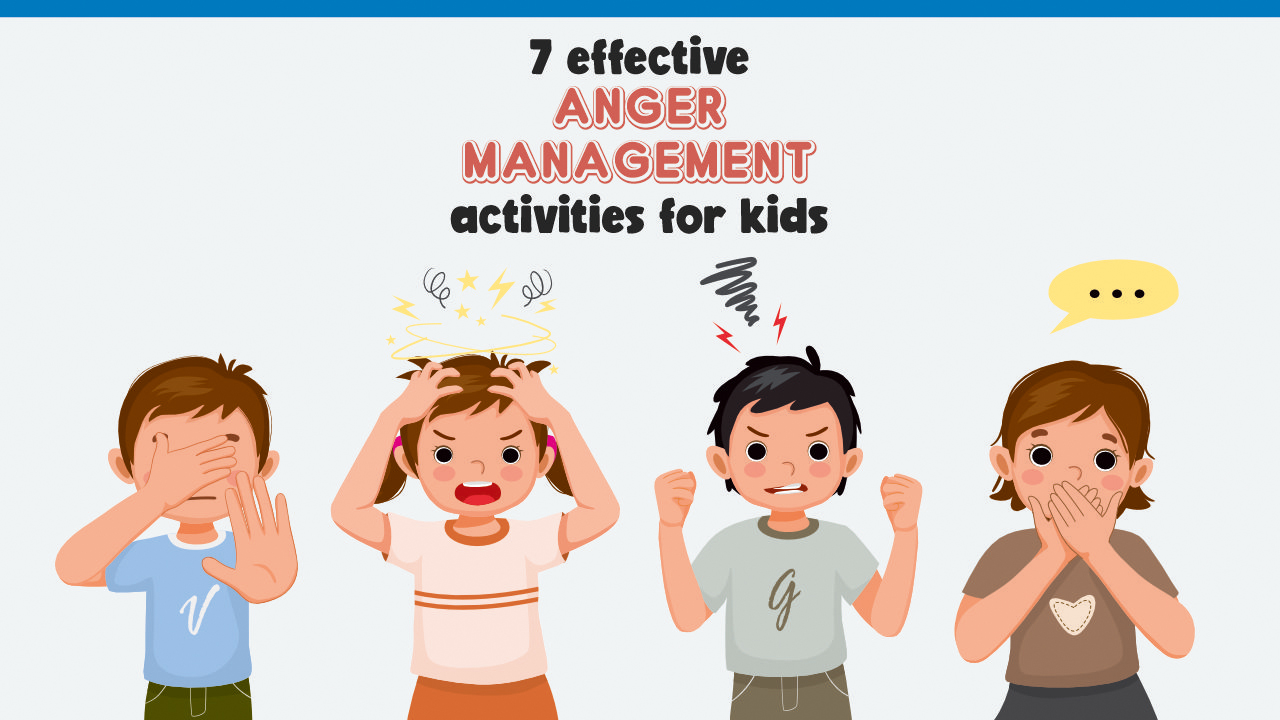Anger naturally expresses human emotion. Children, like adults, experience it when upset. Constructive anger is justifiable, but uncontrolled anger disrupts daily activities. Unhealthy expression impacts children’s well-being. Hence, Anger management activities can prove beneficial for kids teaching them the right set of coping skills.
Read more to find out some anger management activities that address the root cause, control outbursts, and help children navigate their feelings.
7 Creative Anger Management Activities for Children
Here are seven effective anger management activities for kids:
1. Encourage deep breathing: Teaching children deep breathing techniques aids in anger management. Slow, deep breaths calm the nervous system. Illustrate how anger elevates heart rate, while deep breathing lowers it. Encourage placing their hands on their heart to perceive the rhythm, fostering self-regulation techniques.
2. Calm corner: Designating a special space for the child’s retreat is an effective anger management activity. This corner should be quiet, cozy, and filled with beloved items that help them relax. These may include soft toys, stress balls, favourite pillows and blankets, books, and more. Encourage the child to use this space whenever they feel upset or angry. It serves as a gentle reminder that taking a break can be beneficial. In the long run, this habit of taking time to regroup will get ingrained and they might end up using this action instinctively.
3. Art Therapy: Artistic expression serves as a potent tool for managing emotions. When anger arises, encourage kids to paint their feelings. Let them use various colours and shapes for perfect expression. This not only helps them process emotions but also enhances their communication skills and unleashes their creativity. Art therapy encompasses diverse activities like clay modelling, drawing, sand art, and more. As one of the unique anger management activities for kids, art therapy provides a safe, non-verbal emotional outlet for little ones.
4. Anger Worksheets: This is a modernised approach to emotion regulation. These anger management worksheets for kids raise awareness of what impedes their emotional well-being and how to address it. The comprehensive journal includes anger management skill cards, signs of anger warnings, an anger thermometer, a colouring sheet, and more. This enables the parents to recognise patterns and typical responses in the child. Understanding these patterns aids in crafting more effective strategies and promoting healthy emotional expression.
5. Meditation and Mindfulness: Meditation proves to be a reliable method for cultivating awareness. Through daily practice, meditation establishes the groundwork for ongoing anger management. Begin by introducing the child to mindfulness activities such as concentrating on their breath or noticing sounds. One can also prompt the kid to envision a tranquil setting like a beach or mountains, and then concentrate on the sensations and scents of that imagined place.
6. Optimistic Affirmations: Brief optimistic statements, when consistently repeated, serve as a potent tool for shifting a child’s mindset. Positive affirmations can be either provided or the child can be empowered to create their own, resonating deeply with them. These affirmations elevate the self-esteem and confidence of young individuals, substituting negative behaviours like anger with optimistic thoughts, thus fostering calmness in the child.
7. Physical Activity: Undoubtedly, physical activities stand out as enjoyable anger management activities for kids, effectively regulating emotions. Engage with children in sports, yoga, or running to release built-up emotional tension. Furthermore, physical activities trigger hormonal release in the body, acting as natural mood boosters. With regular practice, these activities prove highly effective in reducing anger.
In conclusion, the anger management activities for kids mentioned above help control emotions of the child. As a parent, it’s crucial to recognise that it’s not solely about halting negative behaviour, but also understanding the underlying reasons and responding appropriately to soothe the child. Consider incorporating any of these approaches into the children’s daily routines for a brighter future. At Narayana, there is a firm belief in integrating these methods right from the beginning to ensure the child starts off on the right note, as your dreams are our dreams.
Don’t miss out! Follow us on Instagram for exclusive updates and behind-the-scenes content.



Stay connected, stay informed, and thrive with Narayana Educational Institutions!

